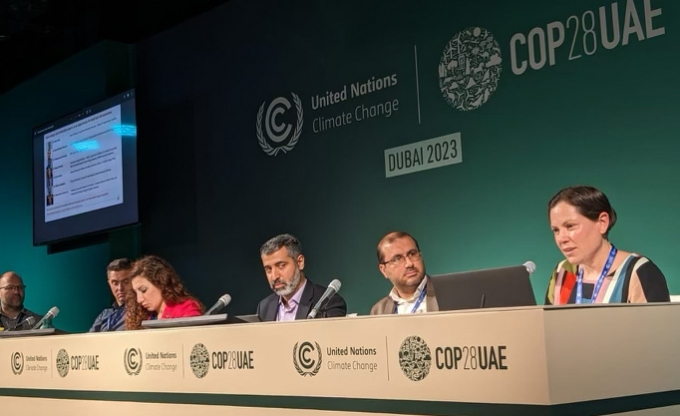
Dr Fiona Beck and fellow academics from the Australian National University (ANU) are delivering an important message in Dubai this week at COP28—the 28th United Nations Climate Change Conference, also known as the Conference of the Parties.

“It’s really hard not to be quite emotional about this,” said Dr Beck, an Associate Professor at the ANU College of Engineering, Computing and Cybernetics (CECC). “We are in the critical decade in hitting our 1.5 degree limit on global warming.”
Even as Australia has begun reaching out to Pacific island neighbours to let them know their populations will be welcomed here if their nations are washed away by rising seas, Dr Beck says that the 198 Paris Agreement signatories are decarbonising faster than expected, due in large part to the fact that renewable energy is now cheaper than fossil fuels in Australia and many other nations.
Trade to spur climate action abroad
During her first panel at COP28, Dr Beck said that Australia is uniquely situated to lead, not just ride the mounting wave of renewable energy entrepreneurship.
Australia has first class wind and solar resources, and the land mass with which to harvest them. Also, the major industries in Australia are exporters of raw materials, rather than large manufacturers. Thus, transitions to green technologies can be made more quickly.
“Australia has been a very large exporter of energy and energy-intensive products for a long time,” Dr Beck said. “We are a trusted trading partner in our region. We are a trusted partner of the USA, of Europe, and we can use those credentials to accelerate trade in zero carbon commodities, clean metals, for example.”
A recent ANU study showed that Australia is the nation best situated to produce green iron and other minerals that require energy-intensive processing, as well as green transport fuels, urea for fertiliser, and polysilicon for solar panels.
“Even though Australia is producing 1% of global emissions, onshore commodities dug up in Australia actually account for another 5% of global emissions,” Dr Beck said. “So there is an opportunity to not only decarbonise ourselves but also our trading partners and neighbours in the Asia Pacific.”
Dr Beck pointed out that our trading partners are now asking about the carbon footprint of commodities they import from Australia in order to meet their own targets for reduced emissions.
With innovation comes economic opportunity
COP28 will include the release of a global assessment of carbon reduction by all nations involved in the Paris Agreement adopted in 2015 at COP21. With new compacts to be made in 2025, Dr Beck said this year’s conference is a crucial gathering to discuss how well we are doing, and how we can do better in the next five year period.

“That’s how the Paris Agreement was designed,” Dr Beck said. “Technology and politics and society are changing at such a rapid rate at the moment, it’s not really possible for anybody to make commitments out to 2050. So we make them in these five year blocks and hopefully ratchet up the ambition each time.”
The primary obstacle to modernising the world’s energy system has been resistance from developed nations with large and influential industries that are heavily invested in fossil fuels. As a result, much of the transition has been driven by new, very successful companies that introduce competition for the incumbents, and increasing public awareness of climate change has led to demand for greener products.
Dr Beck said there has been a narrative shift over the past several years in Australia and around the globe. Faster than expected reductions in cost, particularly for solar power, have movivated industries to make a shift to renewable energy.
Now, industry leaders and the scientific community have been largely on the same page when it comes to the global energy transition. Climate action and economic growth are of one piece.
“Australia and the developed nations are really in danger of missing out in this revolution,” she said. “We’re moving from our primary source of energy being oil and fossil fuel to our primary source of energy being renewable energy. And we are going to need slightly different technologies. But most of what we need is already there and we need to be deploying it now.”
“So it should not be about ‘how expensive is action?’, it should be about ‘how expensive is not acting?’. How far behind are we going to be left if we don’t get in front of this right now and really invest heavily in the decarbonisation of our energy systems?”
Dr Beck’s second panel at COP28 focused on the role of green hydrogen in decarbonising heavy industries, and enabling new industries both at home and abroad.
Complete schedule for ANU academics at COP28.

